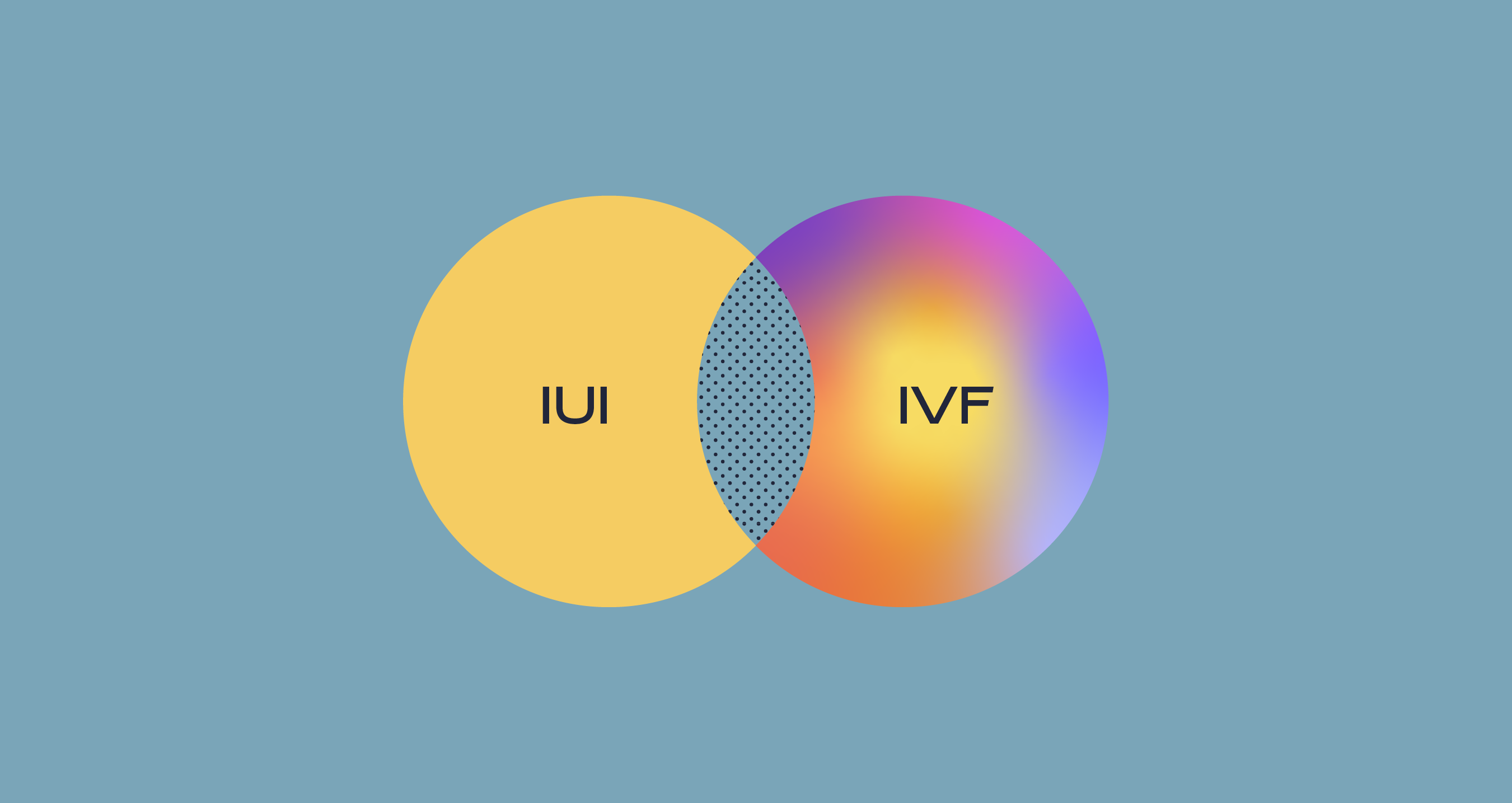IUI vs. IVF: How to Decide

Medically reviewed by Eduardo Hariton, M.D., M.B.A.
Intrauterine insemination (IUI) is often the first attempted assisted reproductive procedure in many infertility journeys. At first glance, IUI looks like the cheaper, easier, and faster alternative to the more expensive, intensive, and longer in vitro fertilization (IVF) process — but lower success rates and other factors may make starting with IVF a better plan for many.
To help you decide which option makes the most sense for you, we've done a deep dive on IUI vs. IVF. But first, here is a breakdown of what you'll learn:
6 Second Snapshot
- IUI places sperm inside the uterus during ovulation, making the distance it needs to travel to meet the egg much shorter.
- In IVF, the egg and sperm are combined outside the body. Then, the resulting embryo is transferred back into the uterus.
- Typically IUI, unlike IVF, does not require injectable medications, but most women use some oral egg stimulation medication (or injectables in rare cases).
- Some patients make better IUI candidates than others. Age and sperm quality are major factors.
- It's recommended to stop after 3-4 IUIs as the likelihood of success with additional tries significantly decreases.
What is the IUI Process?
In simple terms, IUI puts sperm in the right place (at the top of the uterus) at the right time (during ovulation).
IUIs, unlike IVF, do not require injectable medications to increase egg production, but most women use some form of oral medication to maximize IUI pregnancy potential.
IUI is planned around a woman's ovulation cycle. While ovulation is tracked, sperm is collected (either fresh or frozen) and washed in a lab to concentrate the best quality sperm available. The actual IUI procedure involves a doctor placing the sperm in the uterine cavity through a small catheter – essentially fast-tracking the sperm's journey to meet the ovulated egg(s). Some women describe the procedure as feeling similar to a pap smear.
While the laboratory portion of the IUI procedure is now complete, the sperm still has a lot of work to do! It must:
- Reach the fallopian tubes (where fertilization happens)
- Combine with an egg to form an embryo (fertilization)
- Attach to the uterus and grow (implantation)
What is the IVF Process?
Unlike IUI, IVF involves the manipulation of both sperm and eggs in a lab to create an embryo. So, while IUI puts a lot more responsibility on the sperm to find and fertilize an egg, IVF, on the other hand, puts the responsibility on a clinic's lab to create and grow healthy embryos until they are ready for transfer.
IVF most often utilizes injectable stimulation medication to help women grow multiple follicles, which have eggs inside at a time. Before ovulation, eggs are removed from the ovaries using an ultrasound-guided needle. Fresh or frozen sperm is then combined with the mature eggs to fertilize and grow over the next 3 to 5 days. The highest quality embryo(s) can then be transferred to the uterus to (hopefully) implant and develop into a fetus.
IUI vs. IVF: Apples to Apples
| IUI | IVF | |
|---|---|---|
| Fertilization | In uterus | In lab |
| Cost | $-$$ | $$$-$$$$ |
| Typical medication used | Oral pills | Injectables |
| Risks of multiple babies (twins or more) | Moderate (high if using injectable medication) | Low (most often single embryo transfer) |
| Genetic testing possible | No | Yes |
| Freeze embryos | No | Yes |
| Donor eggs | No | Yes |
| Donor sperm | Yes | Yes |
| IUI | |
|---|---|
| Fertilization | In uterus |
| Cost | $-$$ |
| Typical medication used | Oral pills |
| Risks of multiple babies (twins or more) | Moderate (high if using injectable medication) |
| Genetic testing possible | No |
| Freeze embryos | No |
| Donor eggs | No |
| Donor sperm | No |
| IVF | |
| Fertilization | In lab |
| Cost | $$$-$$$$ |
| Typical medication used | Injectables |
| Risks of multiple babies (twins or more) | Low (most often single embryo transfer) |
| Genetic testing possible | Yes |
| Freeze embryos | Yes |
| Donor eggs | Yes |
| Donor sperm | Yes |
Who is a good candidate for IUI?
Some patients make better candidates for IUI than others. A woman's age is a major factor for IUI consideration, as egg quality and quantity directly correlate to age. Older women are more likely to be counseled to proceed with IVF given that the chances of success with IUI are lower and that the downside of waiting 3-6 months may have more significant impacts on their chances of success.
Those with unexplained infertility or anovulation and sperm donor recipients, including single mothers by choice and same-sex couples, may opt to start with IUI if there are no other presenting fertility issues.
Good Candidates for IUI:
- Unexplained infertility
- Under 40 years old
- PCOS or lack of periods
- Using donor sperm
- Unexplained fertility
- Erectile/ejaculation issues
- Low sperm count but > 10M
Good Candidates to Move to IVF:
- Over 40 years old
- Genetic concerns
- Blocked fallopian tubes
- Using donor eggs
- Sperm count < 10M
- Genetic concerns
Where should you start: IUI vs. IVF?
This is a question that is best answered in partnership with your doctor. There are usually multiple possible avenues, and it is always best to share your goals, worries, and decision-making factors with them to help you figure out the right path.
For a deep dive on IUI, click here.
Recent Articles
Share this
Recent Articles

Learn everything you need to know about IVF
Join the newsletter for IVF education, updates on new research, and early access to Alife products.


